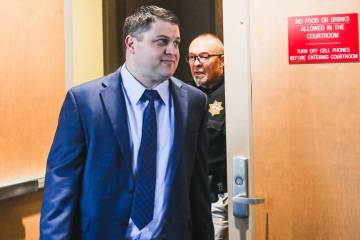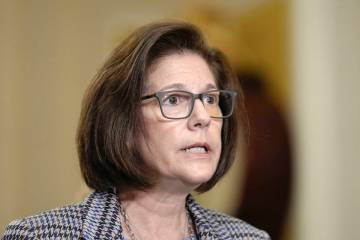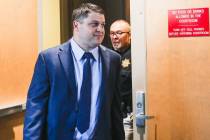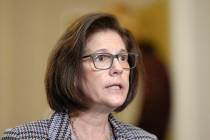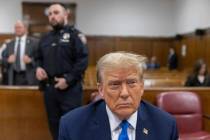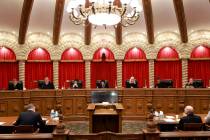Las Vegas, North Las Vegas and Henderson mayors back change in property tax law
Mayors from three of Nevada’s four largest cities said Monday that they will press the Legislature to change the state’s property tax formula to increase the amount of money collected.
Mayors Carolyn Goodman of Las Vegas, Andy Hafen of Henderson and John Lee of North Las Vegas agreed that limits on how fast tax bills can increase relative to property values are hindering recovery from the recession.
The mayors, speaking at a Hashtags &Headlines public affairs forum sponsored by the Las Vegas Review-Journal, highlighted a complaint that has been bouncing around local government circles in recent years: Property tax revenue fell dramatically with values during the recession, but during the recovery, annual limits of 3 percent for residential and 8 percent for commercial properties mean it could be years, or decades, before revenue reaches previous levels.
All three mayors said they would support a legislative look at what they see as a big problem for local government.
“It is not looking for additional resources, it is trying to get back to where we were,” Hafen said.
Lee, a former state senator who was elected mayor earlier this year, was in the Legislature when the caps were approved in 2005. The idea at the time was to prevent rapidly increasing property values from pricing people out of their homes.
Lee defended the decision but said the Legislature didn’t account for the possibility that property values could fall as fast or faster than they rose, leaving local governments strapped for cash.
“The property values were rising so fast we put that in there,” he said. “Then when everything readjusted and it went way down, we had no way of recovering back to that point.”
Goodman didn’t definitively call for eliminating the caps but indicated she would support other mayors pressing the issue in Carson City.
“I would say yes, I would be up there,” she said.
Carole Vilardo, president of the Nevada Taxpayers Association, later told the Review-Journal the limits make it impossible for property tax revenue to recover as fast as it fell, leaving local governments and school districts in a bind.
“What we have since found is that a shortcoming has artificially reduced the amount of revenue that government is receiving to provide their services,” she said.
The median home price in the Las Vegas Valley peaked at $315,000 in May 2006 and began dropping until it reached a low of $118,000 in January 2012. By September, it had rebounded to $180,000, according to the Greater Las Vegas Association of Realtors.
Without the caps, local governments in Clark County, including the school district, would have collected an additional $3.7 billion since 2006, said Jeremy Aguero, a principal at Applied Analysis, a Las Vegas economics research firm.
For the city of Las Vegas alone property tax revenue fell from a peak of about $121 million in 2009 to a projected level of less than $79 million in 2014, a decline of 35 percent. The 2014 level is expected to be similar to 2004 revenue, according to the city.
Whether mayoral lobbying would make a difference in the Legislature, which next meets in 2015, remains to be seen.
Assembly Speaker Marilyn Kirkpatrick, D-North Las Vegas, said she sympathizes with the mayors but isn’t keen on removing caps that were only recently installed.
“What happens when housing prices rise again sharply,” Kirkpatrick said. “You can’t keep taking it out and putting it back in.”
Another option, Kirkpatrick said, would be to review how the state and local boards of equalization handle appeals for commercial properties. Under the law, commercial property owners could have their tax reduced based on a decline in business activity. However, once business picks up again, the corresponding rate of increase couldn’t exceed the 8 percent cap, she said.
Kirkpatrick also said local governments could get more property tax revenue by increasing scrutiny on property owners. The 3 percent cap is only supposed to apply to owner-occupied residential property. Kirkpatrick said it could pay to make sure residential properties taken by banks, bought by hedge funds or other investors for use as rentals to ensure they are moved into the 8 percent category.
If the state’s major local governments were to press the issue in Carson City they probably would seek to include the Clark County School District, which has an operating budget of about $2.1 billion.
The district is even more reliant on property taxes than local governments and would see more revenue as a result of a change.



